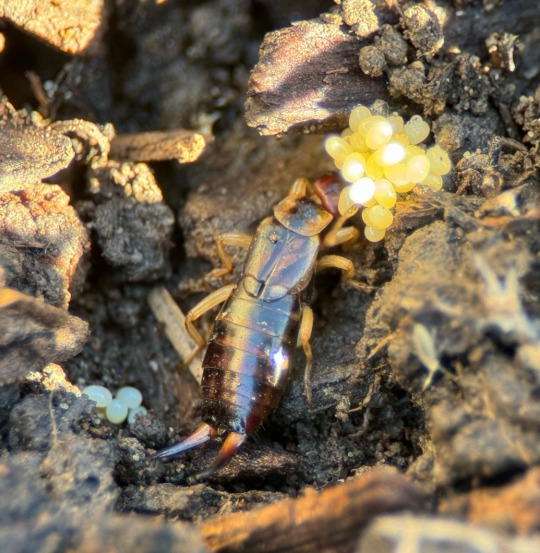#Forficula dentata
Explore tagged Tumblr posts
Text

Female (top) and male (bottom) earwigs. For many earwig species, the easiest way to gender an adult is to look at the forceps (aka cerci). Males tend to have larger and more curved pinchers, while females have straighter pinchers. But don't worry - both are harmless to humans <3
Forficula dentata, Northern California, US
#Forficula dentata#dermaptera#earwig#bugs#nature#nature photography#bugblr#biodiversity#animals#inaturalist#arthropods#entomology#insect appreciation#invertebrates#zoology#photography#original photographer#macro#macro photography#naturecore#dirt#gardening#creatures#soil#pinch pinch#pinchers#bay area
57 notes
·
View notes
Text
#2265 - Forficula auricularia complex - European Earwig

One of at least four species from the complex - auricularia, dentata, mediterranea, and aeolica. They’re morphologically indistinguishable, but differ in their mitochrondria. This one is probably dentata, since that’s the species found in the UK, and since then distributed widely.
Earwigs are omnivorous and nocturnal, have been known to eat various garden plants, and on rare occasions are a pantry pest, but are predators of aphids and other pests.
They have fully developed wings intricately folded under the ear-shaped elytra - hence both the common name and ‘auricularia’ - but rarely fly. The pincers aren’t strong enough to harm human skin, but are used in courtship and threat displays.
After mating the females (this one is a female) exhibit extended parental care of the eggs and hatchlings, to a degree unusual among non-social insects.
Taupo, Taupo Volcanic Zone, New Zealand
5 notes
·
View notes
Text

BFFs sharing the same hidey hole.
Forficula dentata (earwig) and Tanystoma maculicolle (tule beetle)
Northern California
#bugs#bffs <3#except not really#because they’re bugs#nature#nature photography#biodiversity#animals#inaturalist#arthropods#bugblr#entomology#insect appreciation#earwig#beetle#tule beetle#Tanystoma maculicolle#forficula dentata#coleoptera#dermaptera#insects#hidey hole#bff#macro photography#macro#bay area wildlife#carabid#carabidae
63 notes
·
View notes
Text



I discovered this adorable mother earwig with her clutch of eggs under a rock recently. Unlike most nonsocial insects, earwigs are excellent mothers. The female guards the eggs, cleans them, and keeps them warm. She doesn't even leave to eat. After about a week, the eggs hatch, and the female continues to protect, feed, and take care of her nymphs until their second molt (adulthood is 5-6 molts depending on the species). I felt bad for disturbing this lovely lady, so I very carefully put the rock back after taking a few pictures. (Other than the nesting behavior, you can tell this is a female because of the straight forceps. Males generally have curved ones. Also fun fact: earwigs can't really hurt you with their butt pinchers, and they don't want to be anywhere near your ear.) Forficula dentata, Northern California
#earwig#Forficula dentata#Dermaptera#cute#mother#expectant mother#eggs#insect#bug#nature#bugs#nature photography#biodiversity#animals#inaturalist#arthropods#bugblr#entomology#insect appreciation#invertebrates#butt pincher#northern california#macro photography#macro#mother of the year#critter#seriously though I think these pictures are adorable
11 notes
·
View notes